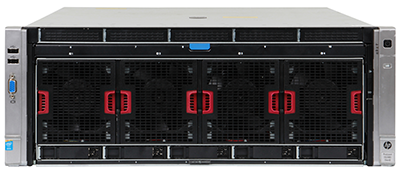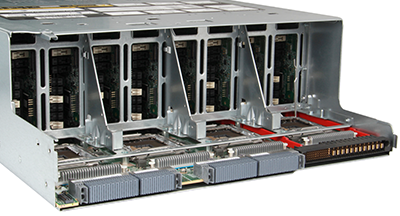Email: [email protected] Ligue agora! +55-11-3717-5537

Providing 1.5 times the number of memory slots compared to the previous generation, the HPE ProLiant DL580 Gen8 server is the perfect solution for use in the private cloud, as a virtualization server, for business critical workloads, and in-memory applications like Hadoop. Using Intel’s Xeon E7-4800/8800 v2 processors, overall system performance is 2.3 times better than HPE’s Gen7 model. HPE’s efficient system design allows for stress-free upgrades and serviceability, and HPE’s iLO Management Engine tools make for easy resource management.
Intel’s Xeon E7-4800/8800 v2 processors offer a maximum speed of 3.4GHz and provide the HPE DL580 Gen8 with 50% more cores than previous generations. Administrators can choose between a 2, 3, or 4 processor configurations. The DL580 Gen8 uses 12 Gb/s SAS controllers to support SSD performance that’s two times better than HPE’s Gen7 model while providing 2.7 times more I/O bandwidth. The system has up to four hot swappable power supplies to support the server’s processing and memory capabilities.
With a four processor configuration, the DL580 Gen8 can provide a maximum memory capacity of 6TB using all 96 DDR3 DIMM slots outfitted with 64GB memory modules. There are two memory controllers in each processor, each of which support four memory channels, with up to three memory modules per channel. Each processor supports two of the eight easily removable memory cartridges, each of which supports 12 memory modules. Registered (RDIMM) and load-reduced (LRDIMM) memory modules can be installed, but mixing different types of memory modules is not supported. Memory speeds of 1600MHz, 1333MHz, or 1066MHz, are supported but keep in mind, memory speed is dependent on the processor model, memory speed, and memory configuration. Users can choose between running the system in independent channel mode or combined channel mode (lockstep) for improved system reliability and availability.
HPE’s Smart Array P830i/2G FBWC Controller supports up to 10 SFF drives for a maximum storage capacity of 16TB. The Flash Backed Write Cache (FBWC) provides infinite data retention compared to Battery Backed Write Cache, which only retains data for two days. As an option, users can choose to add HPE’s Secure Encryption to protect sensitive, mission critical data. Another upgrade from Gen7 servers, HPE’s SmartDrive Carrier, minimizes the chance of data loss from human error with easy-to-read icon based signals to interpret drive operation and status. Optional USB and microSD cards provide support for VMware virtualization and are supported internally.

A four processor configuration can support up to nine PCIe Gen3 expansion slots, all of which are full length/full height, and four of which are x8 width. The remaining five expansion slots are x16 width for greater performance. These expansion slots can be used for a variety of devices, including high performance PCIe SSDs, increased I/O with Infinband options, and converged network adapters.
With all of the management tools laid out on a single screen, management of the this system is significantly easier than HPE’s Gen7 models. Initial server setup is streamlined with Intelligent Provisioning, an embedded solution that provides system configuration through an easy-to-use wizard. New to Gen8 servers, stand-up PCIe cards can be effectively monitored with HPE’s 3D Sea of Sensors. Agentless Management allows for users to manage alerts and monitor the server hardware without OS-based agents to further simplify server monitoring.
The HPE ProLiant DL580 Gen8 server is easy to manage and supports a great deal of memory with extensive expansion options. The system’s design allows for easy processor upgrades with a CPU drawer that slides out of the unit without requiring the chassis itself to be removed from the rack. With the system’s high memory capacity and Intel’s E7-4800/8800 v2 processors, this system is able to support multiple heavy workloads simultaneously and can be used as a virtualization platform with VMware or other HPE certified software.
Memory Slots
Memory type
| Processor | Expansion Slot # | Technology | Width | Connector Width | Form Factor |
|---|---|---|---|---|---|
| 4 | 1 | PCIe 3.0 | x16 | x16 | FH/FL |
| 4 | 2 | PCIe 3.0 | x16 | x16 | FH/FL |
| 3 | 3 | PCIe 3.0 | x16 | x16 | FH/FL |
| 3 | 4 | PCIe 3.0 | x8 | x16 | FH/FL |
| 3 | 5 | PCIe 3.0 | x8 | x16 | FH/FL |
| 2 | 6 | PCIe 3.0 | x16 | x16 | FH/FL |
| 2 | 7 | PCIe 3.0 | x8 | x16 | FH/FL |
| 2 | 8 | PCIe 3.0 | x8 | x16 | FH/FL |
| 1 | 9 | PCIe 3.0 | x16 | x16 | FH/FL |
Diskette Drive
Optional Optical Drive
Hard Drives
| Hot Plug SFF SAS | 12 TB | 10 x 1.2 TB |
| Hot Plug SFF SAS SSD | 16 TB | 10 x 1.6 TB |
| Hot Plug SFF SATA SSD | 8 TB | 10 x 800 GB |
Video
Network RJ-45
iLO 4 Remote Management
micro-SD Slot
USB 2.0 Ports